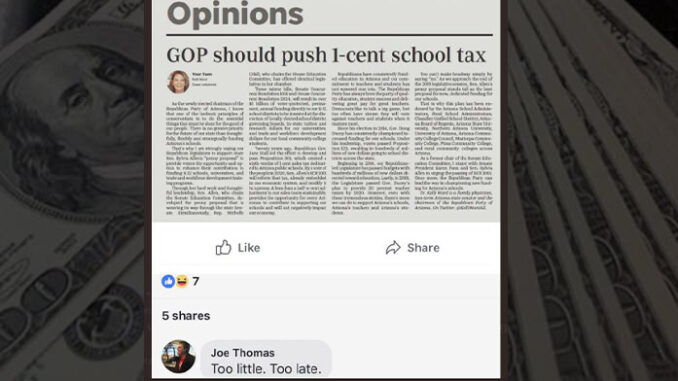
The head of Arizona’s Republican Party, Kelli Ward, is getting slammed by a diverse group of people for her message urging support for a sales tax increase.
Joe Thomas, the head of the Arizona Education Association teacher’ union, called Ward’s tax increase “Too little. Too late.”
Arizona conservatives, like Sen. Vince Leach, along with groups like the Arizona Tax Research Association (ATRA) remain opposed to the full penny sales tax increase proposal.
ATRA argues that “the tax increase provides no necessary education reforms, it undermines the Classroom Site Fund, and unnecessarily dilutes the K-12 share.” According to ATRA, a full penny sales tax could raise a conservative $1.2 billion ongoing.
ATRA released an explanation of their opposition to the bill:
Penny Tax Proposal Includes No Education Spending Reforms
For decades, education leaders have sought to reform uneven policies such as arcane hold harmless formulas, which allow the same pupil to draw different funding depending on which school they enroll. This is unfair and likely unconstitutional. There is widespread agreement that bringing equity to Arizona’s school system will cost money. The conclusion of the two-year Classrooms First Council was that while reforms are necessary, they will not be achieved without new funding. To bypass another opportunity at reform is a critical misstep. Opportunities for tax increases are rare and should include something for everyone, including taxpayers. Taxpayers deserve a system that is fairer and less susceptible to lawsuits. Parents deserve a system where their pupil is worth roughly the same no matter the public school they attend. This proposal simply adds money to an outdated and outmoded finance system.
Proposal Removes Performance Funding
One of the major selling points in Prop 301 was the addition of performance based funding for teachers. Lawmakers proposed and voters approved a portion of Classroom Site Fund dollars be set aside for performance based bonuses. Removing this feature signals a return to bureaucratic teacher pay, where teachers are paid only according to a traditional pay scale. Teachers should be acknowledged and rewarded for making gains in student achievement, not saddled with a one-size-fits-all pay scale.
New Formula Dilutes the K-12 Share
The new formula adds to K-12 schools just shy of $300 million more than they would get from the existing formula (this accounts for maturing SFB debt service, which adds to the Classroom Site Fund at the end of 2020). A sales tax increase which moves Arizona near the top of the nation in total rates should buy more than a 2.9% bump in K-12 noncapital funding (using JLBCs FY19 $10.2B estimate). While it’s understandable that advocates want to “spread the money” to all public education, it’s hard to argue university and community college needs require 170% and 126% increases in their sales tax funding.
With Prop 123, the 20×2020 plan, and District Additional Assistance restoration, the state has committed $1.3+ billion to K-12 education in the last several years without any finance reform. This doesn’t account for increases in population and inflation funding, School Facilities Board increases and other new funds. This less than $300M increase to K-12, which amounts to roughly 63% of new available funds, amounts to $261 per pupil statewide and creates little opportunity for reform.
The Juice Isn’t Worth the Squeeze
Convincing taxpayers to open their wallet is always a challenge. They should be respected enough to offer reforms which improve Arizona schools, not simply add funds. Among other reforms, Prop 301 phased out the expensive and unequal Excess Utilities fund. This one-cent sales tax plan lacks reform, sends the wrong message to teachers and taxpayers.
